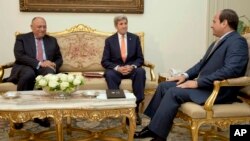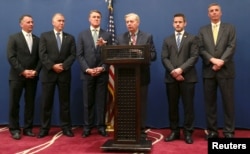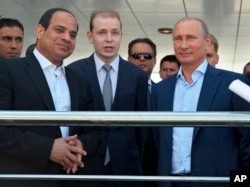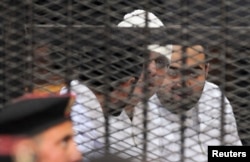For months, some U.S. lawmakers and activists have called on the government to suspend military aid to Egypt over its violent crackdown on dissent. But analysts say despite these concerns, aid levels will likely remain unchanged and perhaps even rise.
Recent weeks have seen a flurry of visits senior U.S. officials, confirming that Washington views President Abdel Fattah el-Sissi as an important partner in maintaining stability in the region.
Chairman of the Senate Appropriations Committee on Foreign Aid Lindsey Graham last month announced he’d push for “billions” of dollars in emergency aid to countries fighting Islamic State in Libya and Egypt's Sinai peninsula.
“I think [Sissi] is somebody we can do business with. I think he’s the right guy at the right time,” Graham said. “We all understand that Sissi is not perfect, but the failure of Egypt would be a catastrophe for the world.”
Friends with benefits
The U.S. gives Egypt $1.3 billion a year in military aid annually.
Egypt is the Arab world’s most populous country and, as a big Arab influencer, poised to advance U.S. interests among its neighbors. It houses Al Azhar University, a bastion of Sunni Islam and a counterweight to Iran’s Shi’a influence.
“The U.S. Egypt relationship did a lot for the United States when it was created,” said Jon B. Alterman, Middle East director at the Center for Strategic and International Studies. “It was a big flip during the Cold War, when Egypt went from being a client of the Soviet Union to a friend of the United States.”
The friendship has given the United States access to Egypt’s airspace and the Suez Canal, as important in wartime as it is to peacetime trade. But most importantly, Egypt has upheld its 1979 peace agreement with Israel.
“There really can’t be an Arab-Israeli war without Egypt on board, and Egypt has been very clear that it won’t fight another war with the Israelis,” said Alterman. “That has changed not only the U.S.-Israeli relationship by making the Israelis much more secure, but prevented any number of possibilities of what might have happened otherwise.”
U.S. political and financial backing has helped Egypt build a strong military, outfitted with mainly U.S.-made equipment.
Washington’s quandary
After Sissi seized power from President Mohammed Morsi, of the Muslim Brotherhood, and in the wake of a violent clampdown on Morsi's supporters, the U.S. was forced to reassess its policy toward Egypt. Washington has faced similar dilemmas in the past, said Michael E. O’Hanlon, a defense and security policy expert at Washington’s Brookings Institution.
“This reminds me of a lot of our Cold War dilemmas when we were trying to figure out how do you support somebody like Mobutu or Pinochet, these kinds of leaders,” O’Hanlon said. “Our view back then was they might just swap sides and be bought out by the Soviet bloc.”
Many officials and analysts favored sending a strong message to Sissi about his violent crackdown on dissenters.
“We weren’t all that thrilled by the coup in the first place,” O’Hanlon said.“But even those of us who might have been prepared to tolerate it do not in any way approve of the way in which he has turned any opposition, anybody who has any smacking of Islamism...into a mortal threat, indistinguishable from the hard-line jihadists.” In October 2013, the Obama administration decided to trim aid and loan guarantees to Egypt, pending a “credible” democratic process.
Sissi then turned to Russia and France for weapons and political backing.
“Egypt did not become more democratic after we pulled back,” noted Eric Trager, Esther K. Wagner Fellow at the Washington Institute for Near East Policy. “And it was less than an ally.”
Moreover, said Trager, the pullback reinforced a popular anti-American narrative in Egypt.
“In their view, the political tumult of the previous five years was not the product of anything organic within Egyptian society; it was due to a foreign conspiracy to stir up trouble in the country and keep the region unstable,” Trager said. In the end, Washington reinstated military assistance, citing national security interests.
Foreign policy is about national interests, said Dalia F. Fahmy, Professor of Political Science at Long Island University Brooklyn. “It’s our national interest to maintain the Camp David accord, protect Sinai, maintain flyover rights and access to the Suez Canal and cooperate against terror.”
That said, she believes Washington may have signaled that Sissi can get away with violent political repression.
“Because the United States isn’t going to do more than slap your hand publicly,” Fahmy said. “It was also a signal to the Egyptian people that they didn’t have democratic support that the West touted during the revolution.”
For his part, O’Hanlon believes the United States still has choices.
“If we were to, for example, hold back half our aid and have our visits to Egypt be primarily by lower level technical collaborators as opposed to high level prestigious officials, we could still collaborate on the fight in Sinai, we could still sustain enough influence in Egypt,” O’Hanlon said.
He believes Egypt isn’t likely to break off its relationship with the United States.
“Sissi’s main goal in life is actually to beat these hard-line terrorist elements,” O’Hanlon said. “He might work more closely with Russia if he got mad at us, but not in a way would deprive us of our security relationship.”








